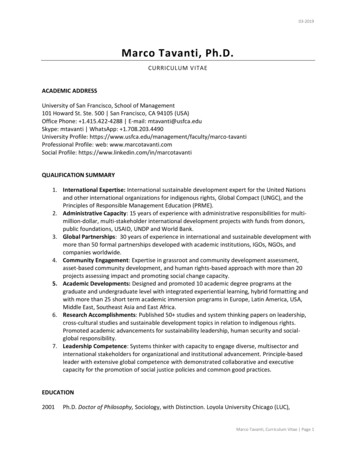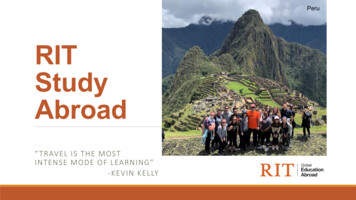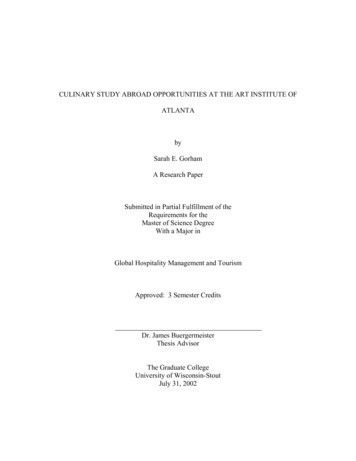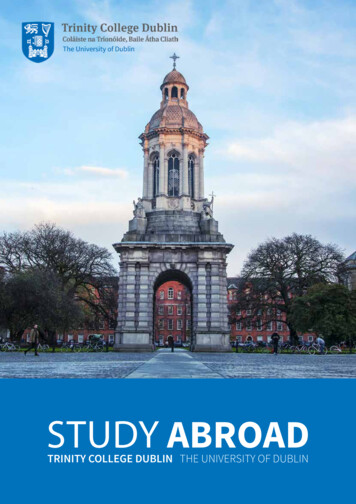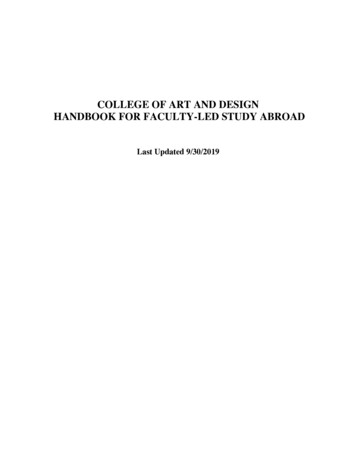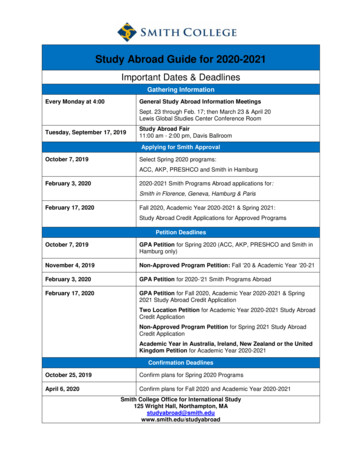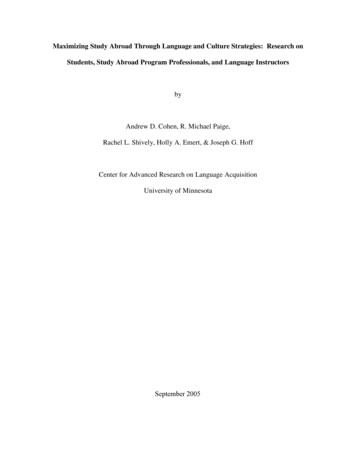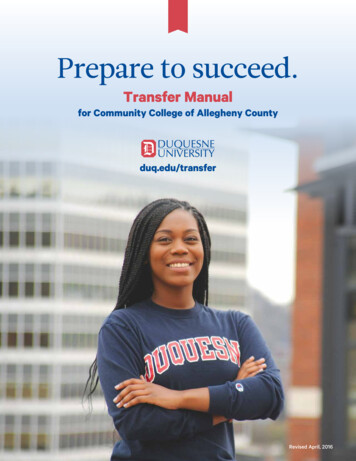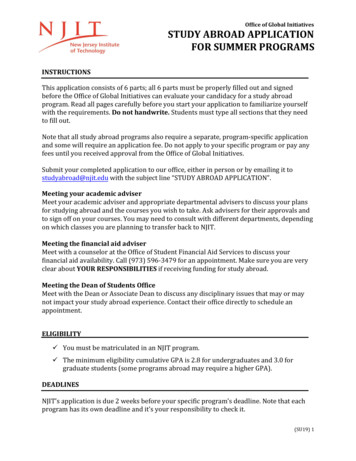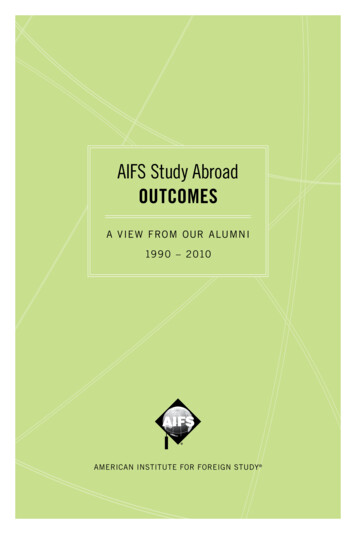
Transcription
AIFS Study AbroadOutcomesA view f rom our alumni1990 – 2010American Institute FOR Foreign Study
Copyright 2013 American Institute For Foreign Study All Rights Reserved.
Contents1Introduction5Executive Summary6 Survey Highlights9Program Impact10 Outcomes14 25 Years Later 17 Next Steps: Innovating for the Future19 Appendices19 Response Results – Demographics, etc.21 Travel-Related Questions22 Foreign Language Study23 Programs Represented in the Survey Responses24 Survey Backgroundi
25 References27 Acknowledgments27 With Many Thanks to 28 AIFS Study Abroad Board of Academic Advisors29 AIFS Staff in the U.S.31 AIFS Staff in London33 About AIFSii
Introduction“It’s critical that all graduates of American high schools and collegeshave certain ‘21st-century skills’ that will enable them to competein a worldwide marketplace, such as understanding internationalperspectives and being able to work collaboratively with peers fromdifferent cultures and backgrounds.” (August, 2011)—Maureen McLaughlinU.S. Department of EducationDirector of International AffairsAs AIFS approaches its 50-year anniversary in 2014, having alumni of ourcollege study abroad programs reflect on their international experience andits impact on their lives is a fitting way to evaluate the influence of our programs.This report describes and analyzes how alumni regard the impact of theirstudy abroad experience on their personal and professional lives and documents program participation trends between 1990 and 2010. We last surveyed our alumni in 1988 and found that their program’s impact on both1
personal and professional issues was significant. Understanding how ouralumni view the impact of their study abroad experience is essential as westrive to uphold our long-standing leadership role in the international education field. The findings of this most recent survey clearly convey the strengthand sustainable impact of our program model. Our intention is to conductimpact surveys on a more regular basis as part of our continuous assessmentplan, which provides an avenue for dialogue with alumni and enables us tomake necessary adjustments to strengthen our programs.Especially because of the economic downturn in the past five years, increased attention has been paid to the impact of an international experience—whether through a period of study, service, or volunteering—upon a student’scareer development and success in advancing prospects for employment aftergraduation. In the twenty-year period for which we conducted our survey, agrowing body of research has emerged that supports such a connection andalso points to the importance of campus efforts to internationalize students’curricula and diversify opportunities for them to gain international experience. This research comes from industry, nonprofit organizations such as ours,and academic institutions. The thrust of these reports, surveys, and researchstudies is that international educational experiences unquestionably have thecapacity to influence student career development on many levels.As more and more campuses seek to align the required outcomes of studentlearning with the goals of study abroad programs, business and industryhave also re-aligned their approach to hiring talent to meet the demands ofthe global marketplace. AIFS has developed new program models and newcampus partnerships to widen our reach to students and faculty. We knowthat the complex requirements of our global economy, together with theincreased mobility of students after they graduate, combine to create a newvalue added to studying abroad as an undergraduate.According to Laurette Bennhold-Samaan, Managing Director at AperianGlobal, companies are searching for global talent with the unique skills setsthat students can acquire through their study abroad program experiencewith AIFS:“In today’s global economy, where complexity and change are thenorm, attracting and retaining culturally competent talent willcontinue to be a challenge for companies globally. Internationalexperience has become a critical asset for all global organizationsand will continue to create a competitive advantage—both forthe individuals and for the companies that hire them.” (personalcorrespondence with Martin Tillman, June 14, 2011)2
The changes in the global marketplace over the past twenty years will onlyaccelerate trends such as the following: Given the impact of globalization in the workplace, it is advantageous fora student to consider the career implications of what may be a once-ina-lifetime educational experience. This means that they ought to engagewith both study abroad and career service advisors to assess the right fit ofa particular program with their career aspirations and academic interests. Success in today’s global marketplace demands increased adaptability,cross-cultural sensitivity, political awareness, and intellectual flexibility.Program providers must take such skills into account as they design programs and advise students throughout their period of study abroad. Employers are taking a more proactive interest in the outcomes of education abroad experiences as they struggle to find a globally competentworkforce that meets their needs. Employers, especially those doing business internationally, are interestedin whether or not a job applicant demonstrates that as a result of his orher international experience, he or she has developed the requisite skillsand sensitivity that make him or her stand out as the strongest candidatefor a particular job.The reality for businesses or organizations in any sector is that they musthire talent with a global perspective and who are, by any definition, “globalready.” How will a college student meet that requirement? We believe thatour programs can provide a roadmap to achieving the kind of knowledge andbroader worldview that is strategically essential in the workplace studentswill enter as they launch their careers in coming decades.Alumni whom we surveyed are now in their late 20s to late 30s; theircareer paths have unquestionably been greatly influenced by globalization ofthe marketplace since they graduated. Their job searches may have led themto explore fields and locales which may not have been open to them duringtheir undergraduate years. The demands of their workplaces have requiredthem to learn new skills and new languages and adapt to complex problemsin their relationships with their clients.The results of this alumni survey demonstrate that our programs havemade a significant contribution to the personal and professional development of past program participants. We believe our holistic approach to thedesign of our programs has sustained the high quality of the experiences3
we have provided students in the past two decades. And we’re confidentthat the challenges students face when studying abroad, when tied to theiracademic learning goals and career aspirations, will help them develop theflexibility, curiosity, and self-confidence that are the foundation for personaland professional success throughout their lives.Our challenge is to innovate in such a way as to offer students a studyabroad program experience equal to their expectations and those of theirparents. Our goal is to foster a level of academic excellence that sets AIFSprograms apart from the programs study abroad advisors bring to the attention of their students.4
Executive SummaryWorking in a broad range of fields since their undergraduate studies, AIFSalumni report that their study abroad experience resulted in significant impact in several key areas of personal and professional development. Eightyfive percent of our respondents report that studying abroad with AIFS was“the most meaningful experience of my undergraduate education.” Givenhow many extra-curricular and off-campus activities are available to undergraduates, we’re pleased to learn that, over time, studying abroad on oneof our programs has remained such an important aspect of their collegiateexperience.With nearly 1,600 responses from alumni who participated since 1990,this pool provides a set of leading indicators in viewing the long-term andsustaining impact that AIFS has made in the lives of its 140,000 collegeprogram participants since it was founded in 1964.While a number of standardized instruments can be used to measure intercultural development, we chose to collaborate with academic partners todesign a multi-faceted survey that captures self-reports on the impact of theAIFS experience on Cultural Understanding & World View, Professional &Career Development, and Personal Growth & Values. We would like to makethis survey of program outcomes and impact a longitudinal study, seeking5
input from respondents at regular intervals over time to track changes andtrends and monitor the impact of their program experience using the sameset of questions.Key outcomes of the survey include: Just over 85% of all respondents agreed that “studying abroad with AIFSwas the most meaningful experience of my undergraduate education.”“[Study abroad] is without a doubt a key experience that informedmany goals, decisions and career steps I have made since then.”—Kelly Holland, Granada 92% of respondents reported that AIFS coursework helped them learnabout their host country, and 98% report the program as a whole “impacted my knowledge about another culture.” Nearly one-third of respondents reported that they considered studyabroad options as a factor in choosing their college. These students hada significantly more positive experience abroad; they reported greaterimpact on nearly every developmental factor used in the survey. While itis likely that these students are pre-disposed to making the most of theirexperience, we think it challenges us as international educators to helpall students think more intentionally about their goals and objectives instudying abroad. 56% of respondents agreed that studying abroad contributed to “developing skills and intercultural competencies which contributed to obtainingmy first job after graduation,” and 80% reported that it contributed to“my ability to adapt in diverse workplace environments.”Survey HighlightsAcademic Impact: While only 32% of respondents reported that their “desire to study abroadinfluenced my selection of undergraduate college,” those students who didso reported a greater impact on nearly every developmental factor. In fact,these students reported having a significantly more positive experienceabroad. This is an interesting correlation that may point to the need to6
strengthen our outreach to high school advisors. It also points to the predisposition for study abroad of students who already are thinking aboutinternational experience in their high school years and who have alreadytraveled outside the United States with their families. Studying in an English- vs. non-English-speaking country did not differently impact the reported quality of the study abroad experience, with theexception of non-English-speaking countries facilitating greater languagedevelopment, knowledge of culture, and learning about one’s host country.As cited in previous research by international education colleagues, thosestudents opting for homestays and who had a high school foreign languageexperience abroad reported greater foreign language development.Career Impact Studying abroad makes a positive impact on skill acquisition for a diverse workplace. Over half (56%) of the respondents agreed that studyingabroad “contributed to developing skills and intercultural competencieswhich contributed to obtaining my first job after graduation,” and a vastmajority (80%) reported that it contributed to their “ability to adapt indiverse workplace environments.”“My French was really perfected at the Cours de CivilisationFrançaise de la Sorbonne .French continues to be an important partof my life today. I recently wrapped up an internship at the FrenchEmbassy in Washington and I am currently an adjunct professor ofFrench at the Community College of Denver.”—Kelly Rogers, Paris Studying abroad also has some impact on career choice and related considerations. Over one-third (34%) of alumni reported that studying abroadcontributed to their choice of field of employment; two-thirds (65%) reported that it contributed to “the importance they place on working ina field that they find interesting”; and 70% reported that it was a factorcontributing to “the importance placed on having personal fulfillment inmy work.” There is no doubt that students have felt and will continue to feelthat both domestic and international off-campus experiences will7
help develop skills and core competencies that will provide an important foundation in their job searches and overall career development.Regardless of whether they find employment in the United States oroverseas, students who choose to study abroad will benefit from doing so with the foreknowledge of its significant potential to play akey role in strengthening their résumé and influencing their career path.“Without this [study abroad] experience, I never would have hadthe connections, motivation, confidence or qualifications to takemy next step and spend two years doing development work inHonduras .None of this would have been possible withoutspending the year in Spain.”—Adam Wozniak, Granada8
Program ImpactWhile the reported impacts in our survey are overwhelmingly positive, thefact is that U.S. undergraduates who study abroad remain a small minorityamong their peers. With only 1.3% of U.S. undergraduates studying abroadin 2010–2011 (the most recent year of available statistics: Open Doors Survey,2012), study abroad alumni with this first-hand international experience arewell-positioned to play a significant leadership role in their local communitiesand beyond over the course of their lifetimes.Study abroad will always have intrinsic value in opening a window onthe wider world for all students. However, colleges and universities in theU.S. and around the world are increasingly focused on how to purposefullyprepare their graduates for the demands of the “global workplace.” Thismeans that our educational institutions must continue to re-think how allaspects of off-campus experiences—both domestic and international—canbetter prepare students to enter the workforce.A report issued by the consulting firm McKinsey & Co. identified globalization as a key challenge affecting the preparation of new professionalsentering the workforce:9
“To address the long term challenges to U.S. employment it isimportant to lay the groundwork for an innovation-driven, adaptiveeconomy that will thrive on the talent of a globally competitiveworkforce.” (Lund, Auguste, Mendonca, Welsh, Ramaswamy, &Manyika, 2011)Whether or not students need to develop their technical skills as opposedto their broader intercultural competencies and cross-cultural skills is notan either/or proposition. Multinational companies, international NGOs, andU.S. firms doing business overseas actively seek candidates who can succeedin workplaces that transcend national borders and manage interactions withindividuals from different nationalities and ethnic backgrounds.OutcomesImpact on Cultural Understanding and World ViewMy participation in an AIFS program abroad contributed to:25%50%My ability to speak a foreign language75%100%56%My knowledge about another culture98%Developing my awareness ofpolitical, economic or social eventsaround the world88%My interest in globalor transnational issues83%My involvement with a global issueMy involvement with a civic causeDefining my political viewsPercentages shown combine “Agree” and “Strongly Agree” responses1045%31%36%
Our findings demonstrate that alumni have retained significant increasedknowledge of another culture; awareness of political, social, and economicevents in the world; and increased interest in transnational issues. These areall invaluable characteristics of individuals engaged in their communities athome and in the world—as well as in the workplace.Professional & Career DevelopmentStudying abroad contributed to:25%My choice of college major50%34%21%My ability to formulate my career goalsand clarify my professional aspirations45%Developing skills and interculturalcompetencies that contributed toobtaining my first job after graduation56%The importance I place onworking in a field that I find interesting65%The importance I place onhaving personal fulfillment in my workMy ability to speak aforeign language in the workplaceDeveloping my ability tounderstand an organization’s cultureMy ability to adapt indiverse workplace environments100%26%My choice of field of employmentMy choice of work sector(e.g., non-profit, private, or public)75%70%36%68%80%Percentages shown combine “Agree” and “Strongly Agree” responses11
Alumni reported sustainable outcomes as a result of their study abroad thathave had a positive impact on their professional and career development.Recent research on employer preferences of desirable skills and competencies in their search for talent match the areas in which AIFS alums reportedsustainable impacts, e.g.: ability to adapt in diverse workplace environments,understanding of organizational cultures, flexibility, and foreign languagecompetency.Personal Growth & ValuesMy participation in an AIFS Program Abroad has contributed to:25%50%75%My desire for more diversefriendships and social networksMy desire to further my education(e.g., post-graduate degree)100%87%52%A better understanding ofmyself and my values92%My sense of confidence in newsituations or when meeting new people93%My ability to acceptdifferences in other peopleMy ability to be moreflexible and open-mindedMy tolerance of ambiguityin a variety of situations86%89%84%My ability to be independentMy ability to take initiative1295%87%
My participation in an AIFS Program Abroad has contributed to (continued):25%Strengthened relationshipswith my family membersStrengthened relationshipswith my friendsThe importance I put ondeveloping my skills and talentsMy willingness to work hard andsacrifice in order to do well in schoolor in my job50%75%100%56%62%68%65%Percentages shown combine “Agree” and “Strongly Agree” responsesAlumni reported significant impact in many important aspects of their personal values and self-development—all of which point to the sustaining impactof having studied abroad. Traits identified are important in terms of strengthening interpersonal relationships both in general and, more specifically, inthe workplace. These include acceptance of difference in others, toleranceof ambiguity, self awareness, confidence in meeting new people, and greaterindependence and self confidence.13
25 Years Later While our 2012 survey questions were not identical to those of an AIFSsurvey of alumni conducted in 1988, there are some sections that providerelated comparisons. We found some interesting parallels that we think areworth sharing:Three factors asked in both surveys:25%International 7%89%Knowledge of a Specific Culture 1988 2012Percentages shown combine “Agree” and “Strongly Agree” responses1492%98%
Factors worded slightly differently in each survey, but offered for comparison:25%50%75%Understanding global issues100%65%Interest in globalor transnational issues83%Maturity100%Independence95%This comparison is indicative of the change over time from the almost unique focus on language to a muchgreater breadth of disciplines represented in study abroad:Proficiency in a foreign language 1988 201297%56%Percentages shown combine “Agree” and “Strongly Agree” responses15
Next Steps:Innovating for the FutureAIFS is continually engaged with its educational partners in the process ofaligning the needs of students to prepare them to enter the global workforce—and to interpret the value of their study abroad experience in terms of boththeir personal and professional development.Here are some of the possible new directions or areas for program innovation that we have identified and will be exploring: Given that AIFS programs have sustainable impact in critical areas ingraduates’ personal and professional life, we will explore ways to haveeducation abroad offices, college admissions offices, school guidancecounselors, and families work together in helping students think seriously about studying abroad as an integral part of the undergraduateexperience. Because of the multiple ways that study abroad has had apositive impact on the career outcomes of our program alumni, we wantto actively encourage students to purposefully consider study abroad asan option early in their college years.17
In order to communicate to students and their families the “return oninvestment” in affording a college degree and the specific workplace skillsthat result from studying abroad, we will seek to use a variety of mediato feature alumni profiles. Alumni who reflect on the benefits of theirexperience a few years—or even a few decades—later demonstrate thetransformative nature of studying abroad. They can help AIFS play a rolein supporting undergraduates to study abroad as we all collectively worktoward the U.S. Lincoln Commission’s goal to increase the number ofstudents studying abroad to one million by 2017, including a demographicproportionate to that of the U.S. undergraduate population, and to morediverse destinations. Explore the creation of a pilot program to link, perhaps on selected campuses, the career and study abroad advising processes. We could considerusing some of our existing career publications with the collaborative development of additional materials for both advisors and students to identifythe most appropriate programs (or program features) that will help themachieve their desired skill set. Create a model “exit” workshop in several countries for students to better prepare themselves on how to interpret the value of their time abroad,how to incorporate new skills/competencies on their résumés, and howto explain the benefits of the experience to employers with whom theyinterview. Our findings show that our programs have a significant impact on the intercultural development of our alumni. Our attention to this aspect ofstudents’ personal and professional growth will continue to become moreand more intentional as part of our continuous assessment process. Citing what Janet Bennett (2008) calls a trend in international education,that “campuses are recognizing that a bridge can be built between domestic diversity and global learning,” we aim to contribute to this linkage bysupporting institutions to help students to explicitly recognize the transference of knowledge and skills from one setting in their lives to the next.18
AppendicesResponse Results – Demographics, etc.Alumni Responding by Breakdown of Time Period:Pre–20007.1% (113)2001–200536.0% (569)2006–201054.0% (855)20112.8% (45)19
Gender Split2012Males:21.3%Females:78.7%Class Year Abroad2012Freshman:1.9% (30)Sophomore:16.2% (257)Junior:55.9% (886)Senior:20.2% (320)High School:1.9% (30)PostGrad:1.8% (29)Note: There were 6 respondents (2%) who wrote in “Faculty” and 26 who wrote in “other”Term AbroadFall27.9% (364)Spring39.6% (516)Summer30.5% (398)Academic YearNo response201.6% (25)(281)
Race/EthnicityWhite82.6% (1309)Multiracial3.1% (49)Black or African-American2.4% (38)Native Hawaiian or Pacific Islander0.3% (5)Asian2.8% (44)Hispanic/Latino3.0% (47)Native American0.4% (6)Travel-Related QuestionsHad You Traveled Abroad Prior to Your AIFS Program?No25.8% (391)Yes74.2%Breakdown by YES response type:With family on trips or vacations42.0% (677)With a school group12.0% (186)Gap year after high school1.4% (24)Short-term study abroad while in college4.5% (68)Semester (or longer) study abroad program while in college1.6% (24)21
Other (e.g., lived, worked, born)9.8% (145)No response(69)Traveled Within Host Country While Abroad:YES88.4% (1401)Summer80.7%Semester90.8%Traveled Outside Host Country While Abroad:YES80.5% (1275)Summer57.0%Semester89.8%Foreign Language Study57% of survey respondents studied in a non-English-speaking countryOf these students:45% reported having studied their host country language prior to travelingabroad18% of these students were majors/minors in the host country language25% responded that as a result of studying the language of the hostcountry while abroad, they continued studying that language upon theirreturn home8% reported that as a result of studying a foreign language while abroad,they chose to study a third language upon their return home22
Programs Represented in the Survey ResponsesArgentinaBuenos elingGermanyBerlinFrankfurtCosta RicaSan JoseHungaryBudapestCzech RepublicPragueIndiaHyderabadMexicoGuanajuatoPlaya delCarmenNetherlandsAmsterdamPuerto RicoSan JuanPolandKrakowRussiaSt PetersburgSouth ntanderPeruCuscoLima23
Survey BackgroundIn May 2012, AIFS Study Abroad sought to survey its alumni across allcountries and program lengths. Since the AIFS system had a data break-pointof 1990 (with prior records being much less accessible), we used 1990 as the“starting” year for alumni surveyed. The survey was first emailed to 16,076alumni, which produced 641 responses within a two-week period. Those641 alumni were then removed from the address list before the survey wasmailed to 19,048 alumni. The mailing included a paper survey with replyenvelope, as well as a web link and unique code alumni could use to complete the survey online. The final response count was 764 from the emailedsurvey, and 862 from the paper mailing (of which some used the web link tocomplete it online). With 1,584 total responses (out of 19,689 alumni), thisreflects an 8% return rate.The 5-page instrument contained questions to establish year abroad, program location, length, class year, accommodation type, academics includinglanguage study, internship or service activity, and prior travel and languagestudy. Optional biographic information was requested, including race/ethnicity, highest level of education attained, and current field of work. The surveywas sent to some participants who, given their participation from only a yearprior, may still have been college students (and thus may not have yet enteredthe workforce or started their career).The sections on impact posed questions in the areas of Cultural Understanding & World View (7), Professional & Career Development (10), andPersonal Growth & Values (13) on a 5-point Lickert Scale ranging fromStrongly Agree to Strongly Disagree [see appendix for full set of questions].Survey Design WeaknessesThere are some points that should be noted as possible biases or weaknesses to this study. Since the research studied AIFS college alumni, it isimportant to note that the findings pertain only to this population, and thosewho respond to this type of survey may also have a bias in their affinity forthe program. The survey cover letter was sent from the Executive Director ofAIFS Study Abroad—who is unknown to students—and this fact might haveaffected the response rate. Another point is that fewer alumni from before2000 responded to the survey than we had hoped. While the mechanics ofcollecting a high volume of “comments” can be challenging, we will seek toinclude more such qualitative information in future surveys.24
ReferencesAmerican Institute For Foreign Study. The Impact of an InternationalEducation on College Acceptance and Career Development. 1988.Deardorff, Darla K. et.al. SAGE Handbook of International HigherEducation. SAGE Publications, Inc., 2012.Institute of International Education (IIE). Open Doors Survey. November21, 2012.Savicki, Victor, ed. Developing Intercultural Competence andTransformation. Sterling: Stylus Publishing, LLC, 2008.Tillman, Martin and American Institute For Foreign Study. Student Guideto Study Abroad and Career Development. 2011.Tillman, Martin, ed. Impact of Education Abroad on Career Development.2 vols. Stamford: American Institute For Foreign Study Inc., 2004.Print.25
AcknowledgmentsWith Many Thanks to Martin Tillman, President, Global Career Compass, for contributions toAIFS Study Abroad Outcomes: A View from Our AlumniDr. Richard Rexeisen, Professor, University of St. Thomas, who conductedall statistical data analysisAnd to these professionals who were consulted on the survey design andformat:Dr. Philip Anderson, Professor, University of St. Thomas (MN)Dr. Carol Baker, Professor Emeritus, University of PittsburghDr. Lawrence G. Buckley, President, Cañada College , Redwood City, CAAndrew Gordon, President, Diversity Abroad27
Dr. Susanne Hill, Executive Director, International Center, University ofFlorida, Gainesville, FLDr. Richard Rexeisen, Professor, University of St. Thomas (MN)AIFS Study Abroad Board of Academic AdvisorsBetty Aikens, Director of Study AbroadHoward University, Washington, D.C.Gretchen Beckley, Director of International ProgramsDrake University, Des Moines, IADr. LaNitra Berger, Director of Postgraduate Fellowships and theUndergraduate Apprenticeship ProgramGeorge Mason University, Fairfax, VADr. Dania Brandford-Calvo, Director, International CenterUniversity of Rhode Island, Kingston, RIDr. Lawrence G. Buckley, PresidentCañada College, Redwood City, CARobert Carolin, Executive Director & Associate DeanCalifornia State University, San Marcos, CADr. Kathleen Costello, Associate Professor of Spanish,Director of Foreign StudySt. John Fisher College, Rochester, NYJames Galvin, Director of Opportunities Abroad & Faculty-led ProgramsUniversity of California, San Diego, CADr. Guru Ghosh, Asso
ing skills and intercultural competencies which contributed to obtaining my first job after graduation," and 80% reported that it contributed to "my ability to adapt in diverse workplace environments." Survey Highlights Academic Impact: While only 32% of respondents reported that their "desire to study abroad
